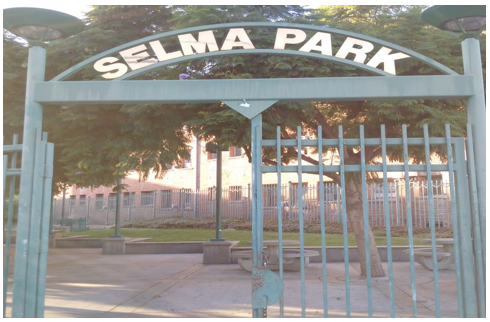CommentsBELL VIEW--I’ve been struggling with an issue lately. My first taste of local politics came via the Neighborhood Council system. I lived up the street from the City’s light pole storage facility. Directly across from a Carnegie Library, in the middle of one of the denser neighborhoods in Los Angeles, filled with school-age kids and renters without backyards, the East Hollywood Light Yard, as it came to be known, represented for me a lost opportunity to make the lives of the people in East Hollywood just a little better.
The kids in East Hollywood, kicking soccer balls up against the razor-wire fence of the Light Yard deserved a park just as much as the kids in Brentwood. More so, since most of them didn’t have a backyard they could play in.
At one of the first planning meetings I attended for the updated Hollywood Community Plan, I remarked to one of the presenters that our neighborhood had no parks. “You have the Selma Park,” he replied.
“You mean,” I said, “that square playground surrounded by a twelve-foot-high fence?”
“Well,” he said with a chuckle only a guy from the West Side could muster, “The Tuileries is surrounded by a fence and people seem to like that just fine.”
The Tuileries – the 75-acre park and garden in the middle of Paris. In other words, let ‘em eat cake.
The struggle I’ve been having is how to reason around what is becoming the consensus response to a housing crisis with my innate distrust of those who figure kids dodging traffic, choking on exhaust fumes, and never learning to ride a bike is just a cost of doing business. Only in America do we believe everything must continue to grow or it dies. No one fights for parks or open space any more. It’s all about housing – or “infill” if you’re a true romantic.
Why is it that in Los Angeles – a city dripping with history on every street corner – all we can aspire to is generic housing? Everything in this City is expendable, and the more iconic, the more beautiful, the better. Take Mariachi Square in Boyle Heights. Why even think about changing it? Would the people of Paris accept a Jamba Juice in the Tuileries?
We live in the dark ages of architecture, with no discernable esthetic beyond the maximization of profits. Parks – the beating heart of any true neighborhood – count for nothing. History is washed away in response to the latest crisis.
And our saviors lick their chops as they carve up the spoils.
When I first joined the Neighborhood Council I expected to have a hand in the direction of my own neighborhood. I pictured myself popping champagne corks with then-Councilmember Garcetti as we made life better for the people of East Hollywood – people who for as long as anyone could remember never had a voice at City Hall. Instead, every battle I took up ended in defeat to the forces of big money, and I got pushed further and further to the fringes.
I feel as if my side in this battle got chosen for me. A lot of people on my side see this as a zero-sum game. I don’t agree with that. But if fighting for a quality of life for the people who actually live here puts me on the wrong side of history – for now, I’m willing to keep on fighting.
(David Bell is a writer, attorney, former president of the East Hollywood Neighborhood Council and writes for CityWatch.)
-cw















